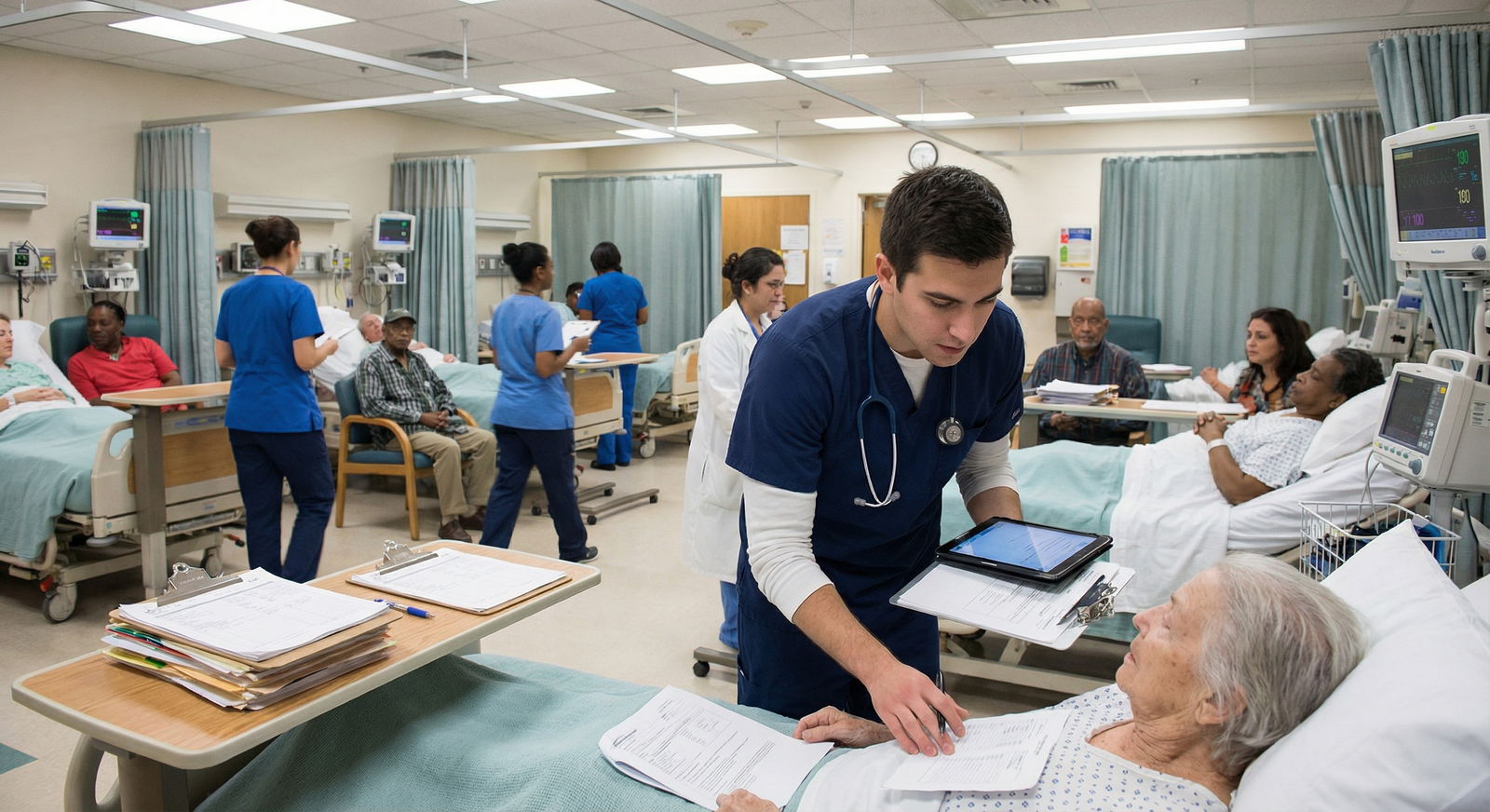
Introduction: How Your Residency Setting Shapes Your Career
Choosing between community and academic residency programs is one of the most consequential decisions you will make in your medical training. Beyond geography or name recognition, this choice influences your daily work environment, the types of patients you treat, the mentorship you receive, your access to research and subspecialty training, and your long-term career pathways.
Both community and academic programs can provide excellent healthcare training and prepare you for board certification. The key is to understand how they differ in structure, culture, and opportunities—then match those differences to your own goals, strengths, and values.
This guide breaks down the realities of community and academic residency programs, clarifies common misconceptions, and offers practical strategies to help you make an informed decision during the residency match and applications process.
Understanding Community Residency Programs
What Are Community Programs?
Community residency programs are typically based in non-university hospitals or health systems whose primary mission is to serve a defined local or regional population. They may be independent community hospitals or part of larger community-based healthcare systems. Some have academic affiliations, but their core identity remains patient- and service-oriented rather than research-driven.
These programs often excel at training physicians who will work in:
- Primary care (Internal Medicine, Family Medicine, Pediatrics)
- Emergency medicine
- Hospital medicine
- Community-based specialties (e.g., OB/GYN, general surgery, psychiatry, anesthesiology)
While “community” might sound less prestigious to some, many community institutions are high-volume, high-acuity centers with robust residency programs and strong outcomes.
Key Features of Community Programs
1. Intensive Hands-On Patient Care
Community residents are usually front-line clinicians from day one. You will often:
- See high patient volumes with significant autonomy (appropriately supervised)
- Perform a broad range of procedures, especially in smaller programs without many fellows
- Develop efficient clinical decision-making skills in real-world conditions
For example, a community internal medicine resident might manage large inpatient teams, independently perform paracenteses and lumbar punctures, and handle cross-cover issues frequently—skills that translate directly to practice after graduation.
2. Close-Knit Culture and Mentorship
Community programs tend to be smaller, with:
- Fewer residents per class
- A more familiar, collegial atmosphere
- Easier access to attendings and program leadership
You may find:
- More one-on-one teaching on rounds and in clinic
- Attendings who know you well as a person and as a learner
- Program directors and coordinators who can more easily tailor experiences to your needs
This environment can be especially supportive if you value personalized mentorship, informal teaching, and a strong sense of community.
3. Flexibility and Less Bureaucracy
Community programs may have:
- Less rigid academic structure
- Fewer competing demands from medical students, fellows, and multiple subspecialty teams
- More flexibility to create elective experiences (e.g., community clinics, rural rotations, local public health projects)
However, the flip side is that some community programs may:
- Have fewer formal didactic sessions or conferences
- Offer less structured research curricula
- Rely more on self-directed learning
4. Emphasis on Primary Care and Community Health
Many community programs are mission-driven around:
- Primary care
- Underserved populations
- Rural or urban safety-net care
- Social determinants of health
You may gain:
- Deep experience with chronic disease management
- Insight into barriers to care (transportation, cost, language, housing, immigration status)
- Experience collaborating with social workers, case managers, and community organizations
If your vision is to become a community-based clinician, build long-term patient relationships, and address health disparities, this environment can be an excellent fit.
5. Building Cultural Competence in Real-World Settings
Community programs often serve:
- High proportions of uninsured or underinsured patients
- Ethnically, linguistically, and culturally diverse populations
- Patients with complex social needs
You’ll learn to:
- Communicate across language and cultural barriers
- Adjust care plans to real-life constraints
- Navigate local resources and community supports
These skills are highly transferable regardless of your eventual practice setting.
Pros and Cons of Community Residency Programs
Advantages of Community Programs
- Robust hands-on experience with significant autonomy
- Strong continuity with local patients and communities
- Close relationships with attendings and program leadership
- Mission-driven focus on primary care and underserved populations
- Often better lifestyle and work-life balance relative to some high-intensity academic centers
Potential Limitations
- Fewer in-house fellowships and subspecialty services (varies widely by institution)
- Less emphasis on research, publications, and basic science
- Potentially smaller professional network beyond the regional level
- Some programs may lack formal exposure to rare or ultra-specialized conditions
These are general patterns; many community programs are evolving rapidly, expanding research and fellowship offerings, and strengthening academic affiliations.

Exploring Academic Residency Programs
What Are Academic Programs?
Academic residency programs are based primarily in university hospitals or large tertiary/quaternary care centers affiliated with medical schools. Their core missions typically include:
- Education and training
- Research and innovation
- Complex subspecialty clinical care
Residents in academic programs practice in environments where:
- Medical students, fellows, and faculty are constantly present
- Clinical care is closely intertwined with teaching
- Ongoing research and quality improvement projects are common
Key Features of Academic Residency Programs
1. Extensive Research and Scholarly Opportunities
Academic programs typically offer:
- Multiple ongoing clinical and basic science research projects
- Dedicated research mentors and infrastructure (statistical support, IRB offices, grant offices)
- Required scholarly projects as part of graduation criteria
Residents interested in:
- Subspecialty fellowships (e.g., cardiology, GI, heme/onc)
- Academic medicine and clinician-educator careers
- Physician-scientist pathways
will often find a richer ecosystem here.
Scholarly work can include:
- Clinical research and trials
- Quality improvement and patient safety projects
- Medical education projects
- Case reports and series
- Guideline development and implementation
2. Broad Networking and Career Visibility
Academic programs typically have:
- Large alumni networks across specialties and institutions
- Faculty with national reputations and leadership roles
- Frequent visiting speakers and conferences
This can translate into:
- Strong letters of recommendation from recognized leaders
- Easier access to competitive fellowships
- Exposure to national organizations and committees
- Potential collaboration with other institutions
For residents aiming at highly competitive subspecialties or academic careers, this visibility and connectedness can be particularly valuable.
3. Rich Diversity of Cases and Subspecialty Exposure
Academic medical centers often:
- Serve as referral centers for complex cases
- Have multiple subspecialty services and in-house fellowships
- Run specialized clinics and multidisciplinary programs
This means:
- More exposure to rare diseases and unusual presentations
- Opportunities to see advanced diagnostics and cutting-edge therapies
- Rotations on subspecialty teams and consult services
If you are undecided about a subspecialty, this can help you explore and choose a path. For those who prefer to manage “bread and butter” community medicine, this environment can still be useful but may feel more removed from typical outpatient practice.
4. Structured Teaching and Educational Culture
Academic programs typically offer:
- Regular didactics, morning reports, grand rounds, and journal clubs
- Formal curricula on evidence-based medicine, quality improvement, and health systems science
- Opportunities to teach medical students and junior residents
You will likely:
- Develop strong skills in critical appraisal of the literature
- Learn to present at conferences and lead teaching sessions
- Build a foundation for future roles as a clinician-educator or faculty member
5. Access to Advanced Technology and Resources
Academic centers often feature:
- Cutting-edge imaging, surgical, and interventional technologies
- Specialized ICUs, transplant services, and advanced therapies
- Interdisciplinary care teams (pharmacists, nutritionists, social workers, advanced practice providers)
These resources:
- Enhance your exposure to modern, guideline-driven care
- Prepare you for practice in technologically sophisticated settings
- May be particularly beneficial if you plan to work in a tertiary center after graduation
Pros and Cons of Academic Residency Programs
Advantages of Academic Programs
- Strong emphasis on research and scholarship
- Extensive subspecialty exposure and in-house fellowships
- Robust educational infrastructure and teaching opportunities
- Large professional networks with national and international reach
- Strong positioning for academic careers and competitive fellowships
Potential Limitations
- Higher pressure and competition among residents and fellows
- Less autonomy early on in some programs due to layered teams
- Variable continuity with patients, especially at large referral centers
- Potential feeling of being more distanced from community realities, social determinants, and primary care-focused practice
Again, these are trends, not hard rules. Many academic centers have strong community engagement, and some community hospitals now maintain significant research and academic infrastructures.
Strategic Factors to Consider When Choosing Your Program Type
When comparing community and academic programs during the residency match and applications process, it helps to move beyond labels. Instead, systematically evaluate how each environment aligns with your goals.
1. Clarify Your Long-Term Career Pathways
Ask yourself:
- Do I envision a career in academic medicine, with research and teaching responsibilities?
- Am I interested in competitive subspecialty fellowships?
- Do I want to practice primarily as a community clinician in outpatient or hospital settings?
- How important is it to me to work with underserved or rural populations?
In general:
- If academic medicine, research, or highly competitive fellowships are central goals, academic programs may provide stronger platforms.
- If you aim to become a well-rounded clinician in primary care, hospital medicine, or general specialty practice, community programs can offer highly practical and focused training.
However, there is considerable overlap. Many community program graduates successfully match into fellowships, and academic program graduates often pursue community-based practice.
2. Evaluate Patient Population and Clinical Exposure
Consider:
- Does the program’s patient population reflect the type of patients you want to serve in the future?
- Do you prefer:
- Complex tertiary care and rare diseases?
- Bread-and-butter primary care with strong continuity?
- High-acuity emergency or trauma care?
During interviews and away rotations, ask:
- What are the most common diagnoses seen in inpatient and outpatient settings?
- How much continuity clinic time do residents have?
- Are there opportunities to rotate at affiliated community sites or VA hospitals?
A well-rounded residency—community or academic—should provide exposure to both common conditions and less frequent but important pathologies.
3. Lifestyle, Workload, and Program Culture
Realistic questions to ask:
- How is resident workload managed? (patient caps, night float, call schedules)
- What is the culture around wellness? Are there functional systems in place, or just slogans?
- How approachable are faculty and program leadership?
- What is the attrition rate, and how do recent graduates describe their experience?
Some community programs may offer:
- A slightly more manageable pace
- Less pressure to publish or present
- A more “family-like” culture
Some academic programs may have:
- More intensive schedules and expectations for scholarship
- Larger classes, where you may need to be more proactive to stand out
Neither is universally “better”; it depends on your personal resilience, support systems, and preferred style of learning.
4. Training Style: Structure vs Flexibility
Compare:
- Academic programs: Often have structured curricula, mandatory conferences, and well-defined research requirements.
- Community programs: May be more flexible and individualized, sometimes allowing greater influence over electives and community experiences.
Ask each program:
- How is feedback delivered and how often?
- How are remediation and support handled if a resident struggles?
- What options exist for customizing rotations—e.g., global health, rural tracks, specialty clinics?
Choose the environment where you believe you will grow best, not just survive.
5. Fellowship and Post-Residency Opportunities
For those considering fellowship:
- Ask for data on recent fellowship match lists.
- Find out whether fellows are present in your specialty and how that affects resident experience (e.g., more teaching vs fewer procedures).
- In community programs with fewer in-house fellowships, ask about:
- External fellowship match success
- Faculty connections to academic centers
- Support for research, case reports, and national presentations
For those heading straight into practice:
- Ask where recent graduates work now: community practices, hospitalist roles, academic jobs, rural sites, or private groups.
- Explore whether the local health system often hires its own graduates.

Practical Steps for Comparing Specific Programs
Beyond understanding the general differences between community and academic programs, you need a strategy for evaluating individual programs.
1. Use Away Rotations and Sub-Internships Wisely
If possible:
- Do an away rotation at a community program and an academic center if you’re unsure.
- Pay attention not just to prestige, but to day-to-day resident life:
- How are residents treated by faculty, nurses, and staff?
- Are residents engaged and learning, or burned out and disengaged?
- How much autonomy do residents have?
These first-hand impressions are often more valuable than reputations or online rankings.
2. Ask Targeted Questions on Interview Day
Tailor your questions to your priorities. For example:
For community programs:
- “What opportunities exist for residents to pursue research or quality improvement?”
- “How often do graduates match into fellowships, and in which specialties?”
- “How does the program engage with the local community and underserved populations?”
For academic programs:
- “How is resident autonomy balanced with supervision, especially on subspecialty services?”
- “What support is available for residents interested in teaching and curriculum development?”
- “Are there opportunities to rotate in community or rural settings as part of training?”
3. Analyze the Program’s Track Record
Request or look for:
- Recent board pass rates
- Graduate destinations (jobs, fellowships, academic positions)
- Any notable accreditation concerns in recent years
High-quality training can be found in both community and academic settings. Concrete outcome data helps differentiate strong programs from weaker ones.
4. Be Honest About Your Own Learning Style
Reflect on:
- Do you learn better in highly structured, academic environments with abundant lectures and research?
- Or do you thrive with practical, hands-on learning and early autonomy?
- How comfortable are you with ambiguity and self-directed learning?
Aligning your learning style with the program culture can significantly impact satisfaction and success.
Frequently Asked Questions About Community vs Academic Residency Programs
1. What are the most important differences between community and academic residency programs?
The most important differences involve:
- Mission and focus: Community programs are service- and patient-care–oriented; academic programs combine care with research and teaching.
- Exposure and resources: Academic programs typically offer more subspecialty services, research infrastructure, and formal teaching. Community programs often provide more front-line clinical experience, autonomy, and closer ties to local populations.
- Career emphasis: Academic programs may be better aligned with careers in academic medicine and competitive fellowships, while community programs are often ideal for those planning community-based practice and primary care.
However, there is considerable overlap, and many programs now blend community and academic strengths.
2. Can I still get a competitive fellowship if I train in a community program?
Yes. Many residents from community programs successfully match into competitive fellowships every year. To maximize your chances:
- Choose a community program with a documented history of fellowship placements.
- Seek out research and scholarly activities (case reports, QI projects, presentations).
- Build strong relationships with mentors who can provide robust letters of recommendation.
- Present at regional or national conferences whenever possible.
Academic programs may offer a more built-in infrastructure for this, but motivated residents from community programs can absolutely be competitive.
3. Do academic programs always provide better healthcare training than community programs?
Not necessarily. Quality of training depends on:
- Faculty engagement and teaching skills
- Clinical volume and case mix
- Program culture, supervision, and feedback
- Educational structure and support systems
Some community programs offer outstanding hands-on training and produce highly competent clinicians. Some academic programs may be so research-focused that practical clinical exposure can feel diluted. Evaluate each program individually rather than relying solely on its “community” or “academic” label.
4. How should I decide which type of program is right for me?
Consider:
- Career goals: Academic medicine vs community practice vs subspecialty fellowships
- Learning style: Structured, research-heavy vs practical, hands-on
- Lifestyle needs: Workload tolerance, geographic preferences, support system
- Values: Desire to serve underserved communities, interest in teaching, passion for research
Talk with:
- Current residents and recent graduates
- Faculty mentors at your medical school
- Advisors who understand fellowship and job market trends
Rank programs based on where you believe you will grow the most, not just where seems most prestigious.
5. Is it possible to transfer between community and academic programs during residency?
Transfers are possible but can be complex and are not guaranteed. They depend on:
- Open positions at the target program and PGY level
- Program director support from your current institution
- Your performance, evaluations, and exam scores
- Timing relative to certification and rotation requirements
If you suspect early that your program type is not a good fit, discuss it promptly with your program leadership and advisors to explore options.
Choosing between community and academic residency programs is not about finding the “best” type of program, but the best fit for you. Whether you train in a community hospital or a major academic center, your initiative, curiosity, professionalism, and resilience will ultimately define your success. Use this decision as an opportunity to align your training environment with the physician you aspire to become.




















